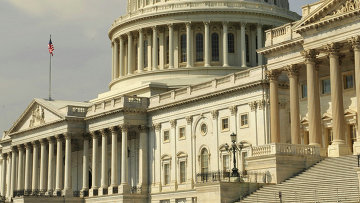WASHINGTON, November 14 - RAPSI. The House of Representatives will vote on the bill on the Magnitsky list and the simultaneous annulment of the Jackson-Vanik amendment on November 16, according the house's schedule.
The Committee on Rules recommended the house to approve the law unanimously on Tuesday. A source in the U.S. Congress told RIA Novosti that the vote will be held next Friday.
The Jackson-Vanik amendment was adopted by Congress in 1974 and imposed restrictions on trade with the Soviet Union. The amendment was a response to the Soviet Union's lack of freedom to emigrate. Formally the amendment is still valid, however, since 1989, the United States has waived the act each year, and the current administration has promised to repeal it.
The U.S. Congress is considering a repeal of the amendment within the context of a resolution to place visa sanctions on officials involved in human rights violations, now known as the Magnitsky list. On July 18, the Senate merged the two measures into a single bill. The House of Representatives said it was planning to consider the repeal before the legislature's summer recess, which began in August, but postponed hearing the issue due to Republican opposition.
In July, a source in the Republican Party told RIA Novosti that the final vote on the law might be postponed until 2013 because of the upcoming national elections. David Camp, Chairman of the House Ways and Means Committee, and House Speaker John Boehner commented as well. According to the latter, the U.S. administration has not demonstrated the due level of support for the measure and must work with Congress more closely on the issue. Currently the measures for normalizing trade relations and the Magnitsky list are not on the House's September agenda. It may not be considered any earlier than November.
The Republican leaders did not specify exactly what they expect from the administration. The Department of State, the White House, the Office of the United States Trade Representative have never attended a Congressional hearing on the issue and have not called on the Congress to repeal Jackson-Vanik. The business community in the United States has been approaching the Congress with similar requests.



